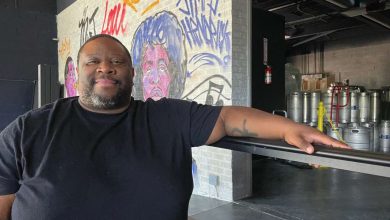‘Mass Blackout’ boycott planned for Black Friday. What anti-Trump movement is about


Economic ‘Mass Blackout’ planned to protest Trump administration
An economic “Mass Blackout” is planned on Black Friday and Cyber Monday to protest the Trump administration.
A coalition of grassroots organizations in New York and elsewhere is calling for a nationwide economic shutdown during the start of the holiday shopping season.
The “Mass Blackout” movement, started by Blackout the System, The People’s Sick Day, American Opposition, the Money Out of Politics Movement and The Progressive Network, is asking Americans to stop all spending and refuse to go to work from Tuesday, Nov. 25 through Tuesday, Dec. 2.
“This is a coordinated economic shutdown − a collective refusal to participate in a system that profits off our pain, exploits our labor, and buys our politicians,” a website dedicated to the movement says.
Here’s what to know.
What are the “Mass Blackout” organizers calling for?
From Nov. 25 to Dec. 2, which includes Black Friday and Cyber Monday, organizers of the “Mass Blackout” movement are urging people to do the following:
- Stop online or in-store shopping, except for small businesses
- Stop working
- Stop streaming, cancel subscriptions and don’t make any digital purchases
- Avoid travel, restaurants and normal consumer behavior
- Stay off ad-driven platforms unless it’s for organizing purposes
The organizations say if you need to spend, only do so at small, local businesses and pay in cash − Small Business Saturday is exempted. And if you have to work, consider donating to Feeding America.
“We’re not targeting small businesses or communities − we’re targeting the corporate systems that profit from injustice, fuel authoritarianism, and crush worker power.”
Why are organizers calling for an economic blackout?
According to the movement’s website, it’s about “people vs. power.”
The groups are fighting back against the Trump administration’s pause of federal anti-corruption enforcement, the funding of “authoritarian candidates” by big business while they “(walk) back public commitments to civil rights, labor protections, diversity and democracy,” and billionaires profiting off consumers.
“The Mass Blackout isn’t just about not spending,” the organizations say. “It’s about rerouting our time, money, and energy back into our communities.”
What other shopping boycotts are planned?
Several other national boycotts targeting the holiday shopping season are also in the works.
The People’s Union USA, a grassroots movement that says it advocates for “economic resistance, corporate accountability and real justice for the working class,” is holding its Black Friday and Cyber Monday blackout from Nov. 28 to Dec. 5.
The “full week of economic resistance” calls for shoppers to avoid major retailers and corporations and support local or independent businesses instead. On Instagram, the People’s Union USA founder John Schwarz urged followers to “remind them that we are the economy.”
Grassroots organizations, including Black Voters Matter, Indivisible, and Until Freedom, are asking shoppers to boycott major retailers, including Amazon, Target, and Home Depot, that they say caved to President Donald Trump and reneged on pledges to support diversity, equity and inclusion programs.
Rather than patronizing retailers that have stood by Trump, the “We Ain’t Buying It” nationwide economic pressure campaign wants shoppers to support retailers that have stood up to Trump, as well as Black, minority, and immigrant-owned businesses and small and local shops.
Do shopping boycotts work?
The organizers of the “Mass Blackout” movement state if five million Americans stopped working for 48 hours, billions would be lost in economic output and supply chains would be delayed, production slowed and shipments disrupted.
But do blackouts work?
Boycotts that ask shoppers not to patronize a business during blackout periods sometimes don’t pack the same economic punch as a sustained boycott, Brayden King, a professor of management and organizations at Northwestern University’s Kellogg School of Management, previously told USA TODAY.
Shoppers will buy before or after the blackout, he said. It can also be difficult during longer boycotts “to convince enough consumers to make those purchasing changes to make a dent at all in the bottom line,” King said.
Emily Barnes reports on consumer-related issues for the USA TODAY Network’s New York Connect Team, focusing on scam and recall-related topics. Follow her on X and Instagram @byemilybarnes. Get in touch at ebarnes@gannett.com.




